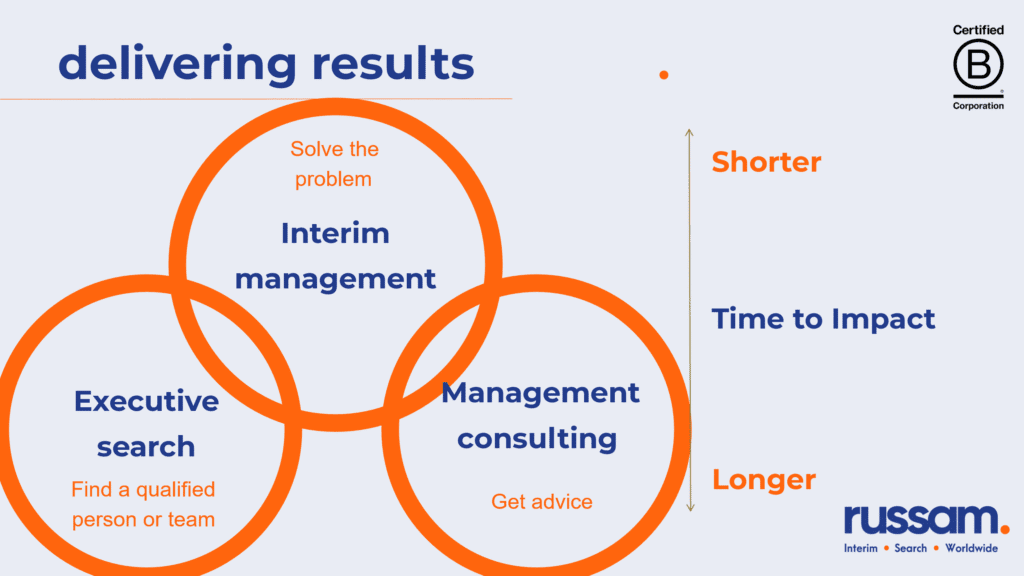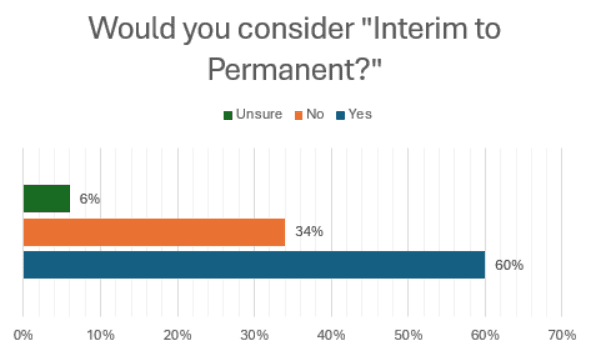Russam Frontline 14: In our challenging markets will we see more “Interim to Permanent” appointments?
According to our Russam poll this month 64% of our Interim Managers would consider “Interim to Perm” and to be honest it’s a long established approach now and especially with our Private Equity clients. Essentially a great way to get boots on the ground faster than a permanent hire and arguably bring down the risk of permanent hire. And resource that is highly experienced – “over-qualified.” Sometimes our clients discuss and brief us on this possibility early on and in some cases the transition to permanent status was not the original intention; but many of our Interims do end up on the payroll. By design Interim is a highly flexible concept. 30% of our Interims would not consider “Interim to Perm” and I often quote that 30 to 40% of our Interim talent pool at Russam (just under 29,000 strong) are “serial” Interim Managers.
We have a new service offering from Russam Interim Management – I>P: Interim to Permanent – https://lnkd.in/ePg2P-ED
This slide shows at a very high level the convergence between Interim, Search/head-hunting and Consulting and the benefits of getting results and delivery in a shorter time frame.

Key benefits of Interim to Permanent appointments:
- Possibility to start within few days
- Interim period as a risk-free trial
- Critical resource through times of change and difficult trading conditions
- Reduced recruitment risk
We’ve had two examples in the past few weeks of experienced Interim Managers (with multiple assignments under their belts) going perm:
- Private textiles company in the north of England. We placed an Interim Chief Revenue Officer to restructure their approach to sales and channels to market and grow through a back drop of uncertainty with things such as the Trump tariffs. The project was highly successful and coincided with work on succession planning for a new group CEO. Our interim was selected through a process to become the new leader and the organisations third ever CEO.
- Large consumer finance company needed an Interim Product Consultant to help build a new lending platform across Europe. Our Interim thrived in role and the cultural fit was strong. A new permanent role was created for her and a planned transition to permanent status.
Would you consider an “Interim to Permanent” transition with a client this year?

Interestingly our established Interims pushed back on the approach; though fully aware that it is a popular and growth but perhaps more a sign of the current times:
Comments from our Interims:
- “Whilst I’m sure this will interest some, most Interims I know already completed successful 30+ year staff careers first, before deciding to set up on their own as Consultants / Interims.
- Whilst I am willing to work away from home for a short-term interim role, I obviously can’t do that permanently. So for interim to perm to work for me, it would need to be close to home i.e. commutable.
- Certainly not. I have been asked to join the company permanently on several Interim Assignments, one company even delayed recruiting a permanent replacement for a post I was standing in as an Interim for, because they thought I would just keep doing the job, and wanted me on the staff. I became an Interim for a reason, after a long career in engineering and then in business, and that reason goes out of the window if I become a staff member.
- Not for me. I turned down such an offer earlier this year, and even though the prospect of living overseas was hugely appealing, I couldn’t face being part of a large corporation again after more than 20 years as an Interim.
- I suspect this will be popular at the moment from the candidate perspective – the market is a little challenging.”
In summary,
Interim to Permanent has many benefits. It can be a good option when the business outlook is uncertain and speed is essential to find critical resources. Success is measured form day one and it is a good way to get to know each other and ascertain cultural fit. Perhaps also when the company is going through tricky times and the right talent isn’t as attracted to joining (leaving another firm who are performing better).
But whilst the Interim might be right at the outset; perhaps to tackle a cost reduction exercise; they might not be the right long-term person for the role. Good communications and regular check point meetings can work to address this and could lead to the Interim helping to find the permanent resource (part of a wider legacy plan when the Interim Manager departs). Executive Search in terms of numbers very much remains the preferred approach but I hope my insights have created a few new ideas.
Author: Jason Atkinson – Managing Director

Contact us
Call us on 07930 356305 or email HQ@russam.co.uk








